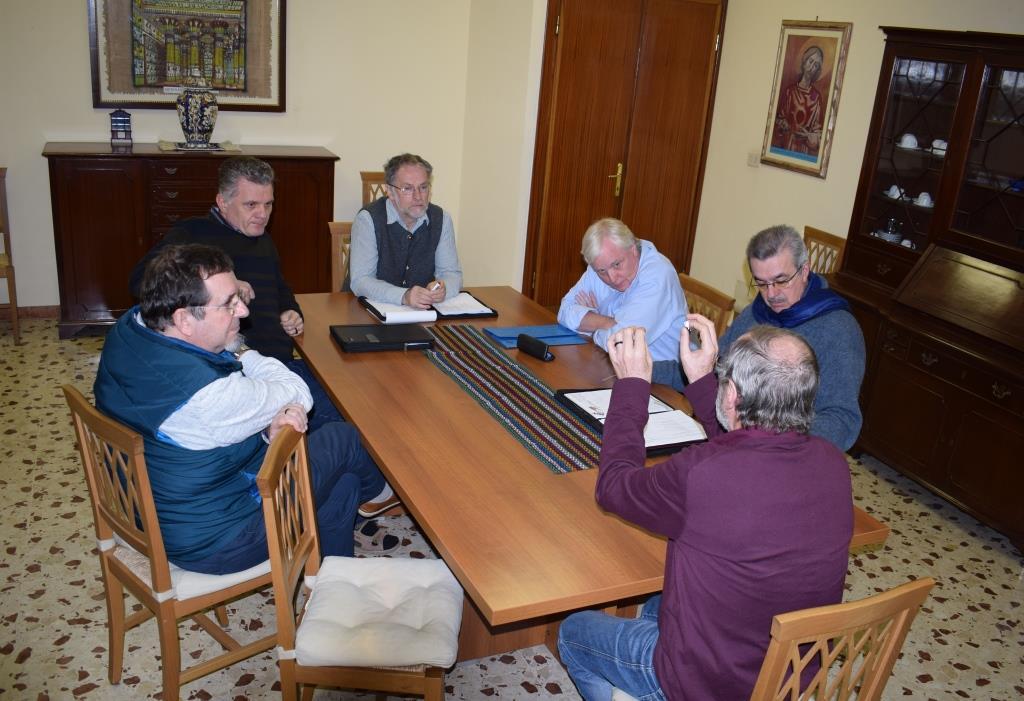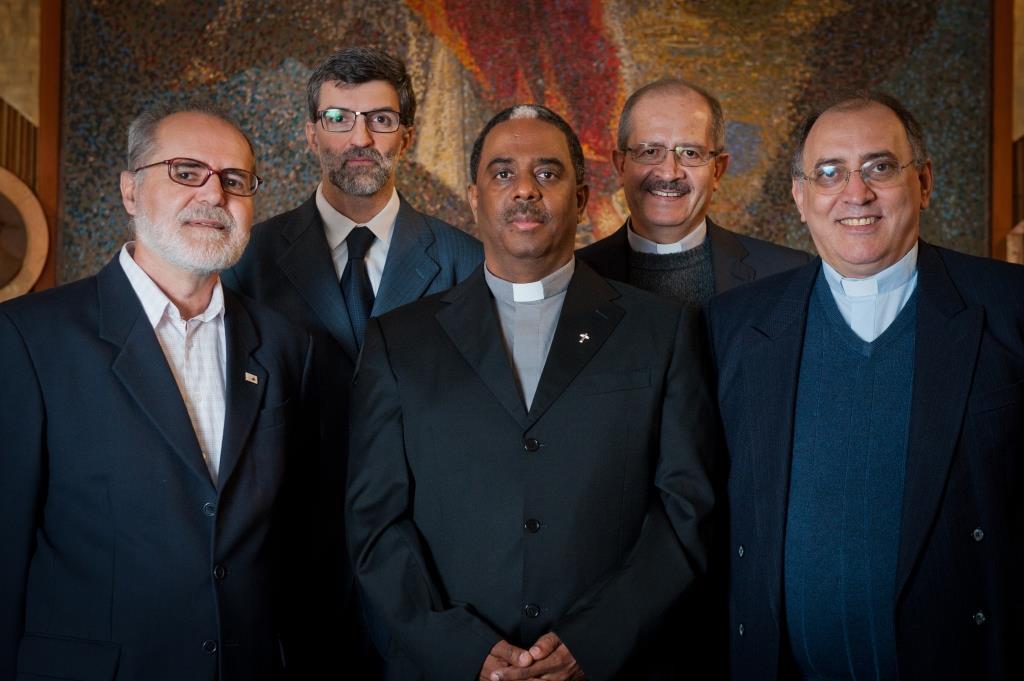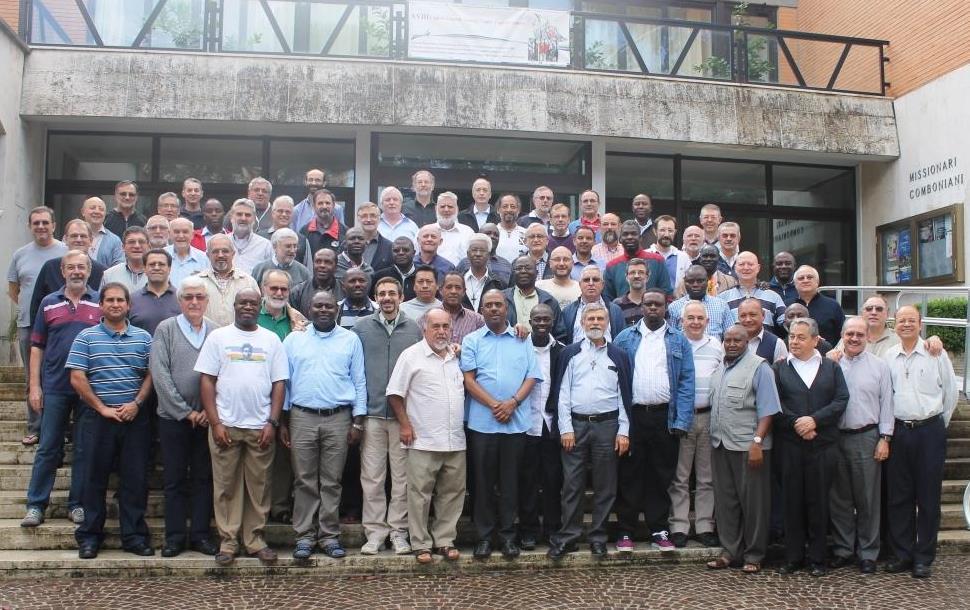Daniel Comboni
Comboni Missionaries
Institutional area
Other links
Newsletter
Wednesday, August 19, 2015
Only two weeks are left before the opening of the 18th General Chapter of the Comboni Missionaries. “How do you see at present the Institute and its members”? I have been asked recently. The overall title of the Chapter reminds us of the essence of what we would like to be and indeed what we are called to be: “Comboni missionary disciples called to live the joy of the Gospel in today’s world”. As foreseeable excellent considerations will be made concerning the situations of confreres, the challenge of internationality and inter-culture in the Institute, the need to refresh and revive our spirituality, our priorities and perspectives as well as structure of government, economic set-up and so on. [In the picture: Fr. Giuseppe Cavallini, Comboni missionary, the author of the article].
Thinking about these things, one has to recognize the positive results and the depth of the intuitions, guidelines and perspectives developed in the previous General Chapters. They should have been then translated into reality by becoming part of the life experience of the members of the Institute operating in the different Continents. Indeed, partially they were certainly realized. However, as it has already been written, we can’t feel totally satisfied of ‘how and how far’ decisions and plans debated in the Chapter hall and later gathered in the Chapter Acts have been put into practice in the day to day life of the confreres and in the evangelization activity of the Provinces-Delegations.
It must be said that inspirations, intuitions and concrete indications which arose from his special charism and were passed on to us by Daniel Comboni, have been defined and elaborated in different ways along the years: “to cultivate and to safeguard our union with Jesus, the first missionary’; ‘to keep our gaze fixed on Jesus Christ loving him tenderly’, ‘to understand what it means a God that has died on the cross for the salvation of the world’, ‘to believe in the Holy Spirit as the true protagonist of mission’, ‘to be contemplative in action’, ‘to choose the poorest and most abandoned’, ‘to evangelize as community’, ‘to be cenacles of apostles’, ‘to use poor means’ ‘to feel and work as Comboni Family’, ‘to make common cause’, ‘to identify and assume the Nigrizia situations’, ‘to work with and not only for the poor’, ‘to choose the marginalized areas , the peripheries and the frontier missions’, etc. All this is fine, however, when I pass from the list of these great and unifying ideals, to the present vision of what we are and are becoming as Institute, a question comes to my mind: are we today assuming and incarnating those basic values in our life as individuals, ad communities, as Provinces-Delegations and as Institute?
My impressions may be conditioned probably by the limited perspective, from which they arise, and I don’t ignore what several individual confreres are doing, yet I think they are based on reality. What do I see then? I want to start with a very concrete example, which I hope may be the exception rather than the norm (but I have my doubts…). Recently a confrere was telling me about a young Comboni who, back to his Province of origin (no need to mention either Continent or Province…) after few years of studies at Rome, called up from the airport so that somebody might go to pick him up. Arrived at the community in an elegant semi-clerical outfit, holding a superb smart-phone, a tablet and surely a personal computer in the appropriate purse, he appeared quite resentful and hardly greeted the community superior. It was later known that he had two reasons to manifest this dissatisfaction: first, the fact of having been welcomed at the airport by a mission worker rather than by a confrere (a fact he interpreted as ‘discriminatory’…); secondly that some of his luggage had not arrived. The second day he was accompanied again to the airport and, once back, he unloaded an enormous trunk and two big bags, to be added to the one he had with himself the first day. Certainly he had his reasons to hold all those ‘belongings’… and he has neither been the first nor will be the last confrere so well… organized, and far from me the temptation to express judgment; however another question come to my mind: if this is the ‘forma mentis’ which characterize the common view of the young generation of Combonis which kind of future will the Institute face concerning the great ‘charismatic’ principles and ideals previously listed and gradually developed along the history of the Congregation? Therefore, I wonder if these ‘core values’ are properly deepened and interiorized along the years in the communities of formation; I ask myself if the new confreres may have trained themselves to base their life decisions upon these values and most of all if, by chance, as Institute, we may not shamefully be deceiving ourselves and the people we serve when we display, especially before young people, the great ideals of Comboni with the illusion that, no matter how we live, they inspire our choices, our missionary methodology and even more our involvement in the concrete life of the people among whom we work. At times it seems to make sense what ironically somebody says: “We profess publicly the vows of poverty”… the ordinary people put it into practice!
If the ‘forma mentis’ of the new Combonis is the one of the young confrere mentioned earlier (indeed it is only one of several cases I could witness personally…); if the tendency-temptation of many is of ‘being served’ by the Institute for their own benefit and self-realization rather than putting oneself to the service of the Institute, the church, the mission, the people and the Kingdom; if the main goal of the individual confrere is to reach, no matter what, his goal of a doctorate or a super-specialization for his own sake; if one thinks that the Institute must recognize his personal rights guaranteeing the necessary coverage of his personal material and financial needs at the point of thinking that, in any case, the Total Common Fund will provide; if – in a word – the personal concerns, plans and needs precede those of the community, the Province or the Institute… we are badly out of track! And we must seriously reflect with honesty about this as we discuss – within the Chapter’s hall – about renewing our spirituality, our identity, our mission methodology and so on! Because my impression is that lately this attitude seem to be gaining ground as a real challenge to the lifestyle and the mentality of many confreres.
Looking, for example, at one of the priority areas of involvement underlined in the last General Chapters and considered part and parcel of our charism as we speak of the poorest and most abandoned of our time, we see that only a small minority of confreres, both elderly or younger ones, have put at the basis of their choices their insertion among the poor of the urban peripheries and in other areas of marginalization, in a lifestyle of real closeness to the people and believing in the use of poor means rather than in the efficiency of money. But many other challenges need still to be considered by all of us: a greater sharing of available resources; a more direct commitment in the animation of the local churches to get involved in facing the critical phenomena of our time (immigration, social marginalization, youth problems, different kinds of exploitation of the weakest…); more attention in welcoming in our activities of evangelization lay volunteers, local and foreign, as well as more cooperation with private and public institutions, non government organizations etc. My feeling is that a good number of the Comboni candidates and young confreres tend to look for a more self-centered missionary outlook, remain far for the daily struggles of most people, have neo-clerical attitudes, look for specializations and ‘professionalism’, tend to close themselves within the structures of the Institute, show little willingness to get involved in the dynamics of the local churches, seem not so interested or trained to read the signs of the time and to analyze and interpret past and present events with the determination to face the challenges and contradiction of our time taking clear stand on the side of the weakest.
In short, just to underline what pope Francis has been constantly preaching and teaching in the past two years, the emerging tendency of the Institute seem to reflect very little the revolutionary push and the renewed missionary challenge which animate the words and actions of the pope, who inspired those who chose the global theme of the incoming General Chapter. What to say as a conclusion? That if we avoid to make a serious examination of conscience as individuals and as Institute, if we don’t take a serious commitment not to leave on paper but to put into practice the beautiful guidelines and decisions which will be formulated by the Chapter, if we won’t assume personally the determination and the radicalism of Comboni in living out the charism and the legacy he passed on to us, we run the risk of nullifying the life-program and the deepest spirit contained in the beautiful theme of the Chapter: to live in spirit of discipleship, namely the ‘sequela’ of Jesus Christ; to regain and set the joy of ‘mission’ at the basis and heart of every evangelization enterprise; of embedding ourselves in the historical processes of our time, so as to give consistence and authenticity to our witness, avoiding the danger of falling – as Institute – in a progressive condition of insignificance.
Giuseppe Cavallini, mccj





